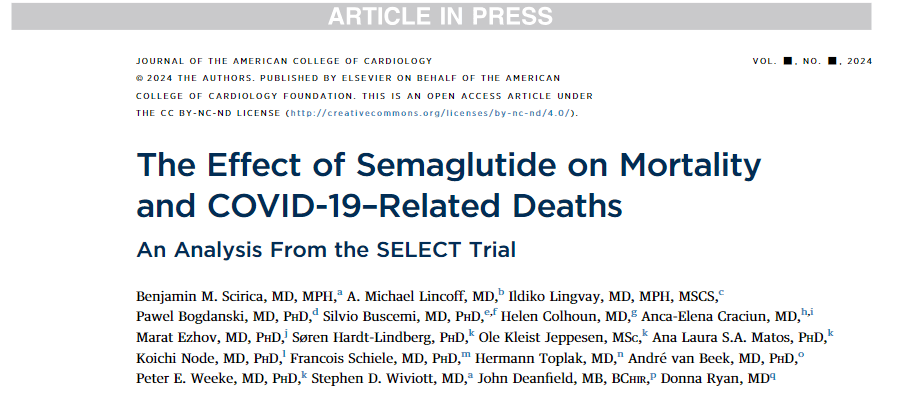Source: Caijing Lianhe News
On September 3, Caijing Lianhe News reported (Editor Zhao Hao) that a new study found that people taking the “weight loss miracle drug” Semaglutide have a lower mortality rate and a lower probability of adverse reactions after being infected with the coronavirus.
Last Friday (August 30), this result was published on the website of the Journal of the American College of Cardiology (JACC), a top journal in the field of cardiovascular research. These findings may suggest that Semaglutide has broader health benefits than previously expected.
Source: JACC official website
Researchers found that among patients receiving a 2.4 mg weekly injection of Semaglutide, there were fewer deaths directly related to treatment compared to those receiving a placebo (43 versus 65); meanwhile, the all-cause mortality from severe adverse events related to COVID-19 was also lower in the Semaglutide group (46 versus 69).
It is worth mentioning that these data are derived from the well-known phase III trial “SELECT,” which began prior to the outbreak of COVID-19 and has indicated that Semaglutide may have a potential role in reducing the risk of serious cardiovascular diseases.
Co-author of the paper Benjamin Scirica stated that in his own research, patients treated with Semaglutide had a 29% reduction in non-cardiac event-related mortality. He added that weight does not seem to be a “primary mediator” of this finding.
The JACC study also showed that Semaglutide improved symptoms related to heart failure, inflammation, and a range of other functions, while also reducing mortality in patients with chronic kidney disease, potentially pushing the drug beyond its “weight loss miracle drug” label.
In the United States, the 2.4 mg Semaglutide subcutaneous injection is marketed as “Wegovy” (Novo Nordisk) for the treatment of obesity and as “Ozempic” (Novo Nordisk) for the treatment of type 2 diabetes.
Harlan Krumholz, a U.S. cardiologist, professor at Yale University School of Medicine, and editor-in-chief of JACC, told the media, “I am starting to think of weight loss as a ‘secondary effect’ of this medication; it really promotes health.”
Source: Novo Nordisk official website
Krumholz added, “I primarily think about cardiac metabolic health, but Semaglutide may have other mechanisms to make us healthier. To some extent, it has helped us resist some adverse effects brought by COVID-19.”
However, he also pointed out that further research is needed on the drug’s effects on the human body. In July, a study published in JAMA Ophthalmology stated that there is a risk of correlation between the use of Semaglutide and the occurrence of non-arteritic anterior ischemic optic neuropathy (NAION).


